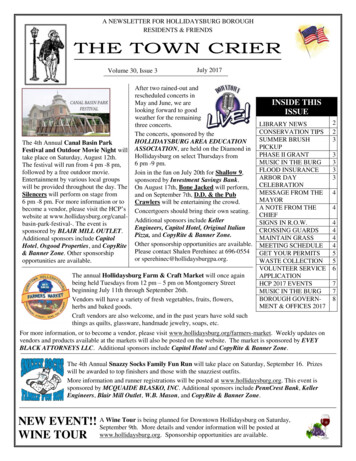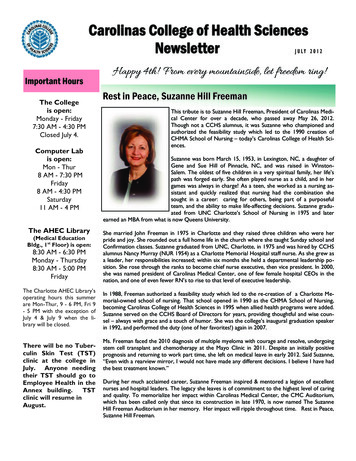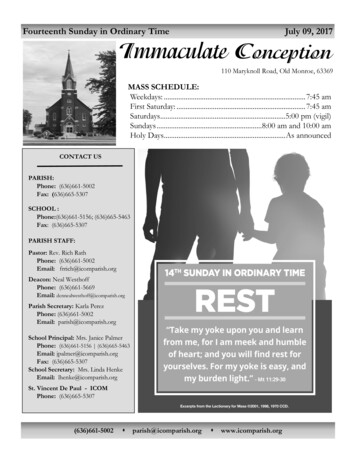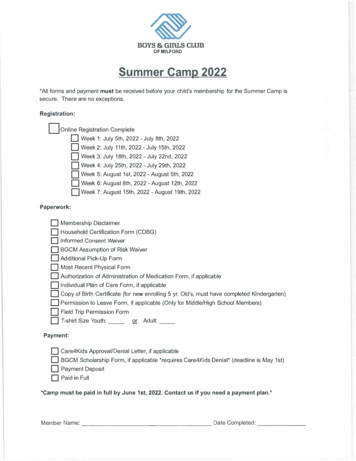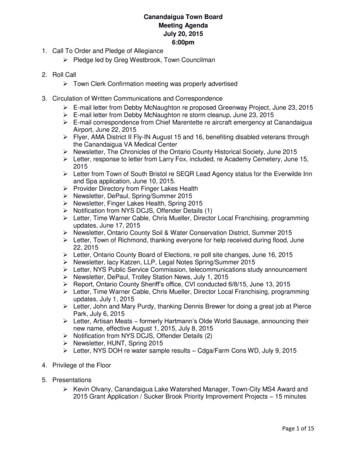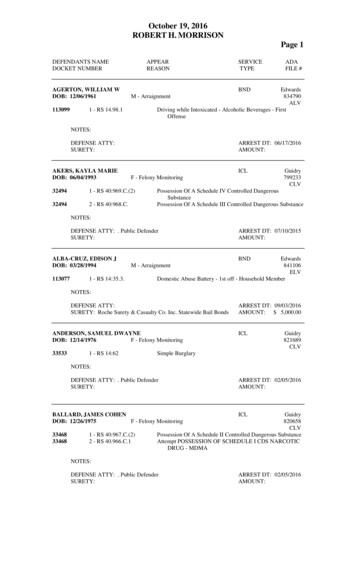
Transcription
JULY 1, 2 0 1 534567How to Deal WithAnxiety
34567 Vol. 136, No. 13Printing Each Issue:52,946,000 IN 240 LANGUAGESJULY 1, �․․․․․․․․․SemimonthlyENGLISHTHIS MAGAZINE, The Watchtower,honors Jehovah God, the Ruler ofthe universe. It comforts peoplewith the good news that God’sheavenly Kingdom will soon end allwickedness and transform theearth into a paradise. It promotesfaith in Jesus Christ, who died sothat we might gain everlasting lifeand who is now ruling as King ofGod’s Kingdom. This magazine hasbeen published continuously since1879 and is nonpolitical. It adheresto the Bible as its authority.COVER SUBJECTHow to Deal With AnxietyPAGES 3-9Anxieties Are Everywhere! 3Anxiety About Money 4Anxiety About Family 6Anxiety About Danger 8ALSO IN THIS ISSUEThe Bible Changes LivesMy Life Was Going From Bad to Worse 10Can We Really Please God? 12Would you welcomemore information or afree home Bible study?Did You Know? 15Bible Questions Answered 16Visit www.jw.org or sendyour request to one of theaddresses below.For the UNITED STATES OF AMERICA:Jehovah’s Witnesses25 Columbia HeightsBrooklyn, NY 11201-2483For CANADA:Jehovah’s WitnessesPO Box 4100Georgetown, ON L7G 4Y4For a complete list of worldwideaddresses, see www.jw.org/en/contact. This publication is not for sale. It is provided aspart of a worldwide Bible educational work supported by voluntary donations. Unless otherwiseindicated, Scripture quotations are from themodern-language New World Translation of theHoly Scriptures.The Watchtower (ISSN 0043-1087) is publishedsemimonthly by Watchtower Bible and Tract Society of New York, Inc.; L. Weaver, Jr., President;G. F. Simonis, Secretary-Treasurer; 25 ColumbiaHeights, Brooklyn, NY 11201-2483, and by WatchTower Bible and Tract Society of Canada, PO Box4100, Georgetown, ON L7G 4Y4. Periodicals Postage Paid at Brooklyn, NY, and at additional mailing offices. POSTMASTER: Send address changesto Watchtower, 1000 Red Mills Road, Wallkill, NY12589-3299. 5 2015 Watch Tower Bible and TractSociety of Pennsylvania. Printed in �․․․․․․․․․․․READ MORE ONLINEOTHER BIBLE QUESTIONSANSWEREDJULY 1, 2 0 1 534567How to Deal WithAnxietyDOWNLOADTHIS MAGAZINEIN VARIOUSFORMATS ONLINErWill God Help Meif I Pray?(Look under BIBLE TEACHINGS BIBLE QUESTIONS ANSWERED)
COVER SUBJECTANXIETIES AREEVERYWHERE!“I went to buy food but found only cookies—for 10,000 times the normal price! The nextday, stores had no food at all.”—Paul, Zimbabwe.“My husband sat me down and said he was leavingus. How could I bear the betrayal? What wouldhappen to my children?”—Janet, United States.“When the sirens go off, I run for cover and lieon the floor as the rockets explode. Hours latermy hands still shake.”—Alona, Israel.We live in times of anxiety, “critical times hard to dealwith.” (2 Timothy 3:1) Many are reeling from financial crises, family breakdown, war, deadly disease outbreaks, andnatural or man-made disasters. Add to this a variety ofpersonal worries: ‘Will the growth I discovered on mybody turn out to be cancer?’ ‘What kind of world will mygrandchildren grow up in?’Not all anxiety is bad. We naturally feel some stress before a test, a performance, or a job interview. And ahealthy fear of danger helps us to avoid harm. But extremeor constant anxiety is destructive. A recent series of studies involving more than 68,000 adults revealed that evenmild anxiety increases the risk of premature death. Withgood reason, then, Jesus asked: “Who of you by beinganxious can add one cubit to his life span?” Indeed, worrylengthens no one’s life. Jesus therefore advised: “Stop being anxious.” (Matthew 6:25, 27) But how is that even possible?The answer involves applying practical wisdom, nurturing real faith in God, and building a reliable hope for thefuture. Even if we do not now face dire circumstances, wemay in the future. So let us see how taking these steps hashelped Paul, Janet, and Alona to deal with anxiety.JULY 1, 20153
ANXIETY ABOUTMONEYPAUL4THE WATCHTOWER“After runaway inflation struck in our country,food became expensive and scarce,” relates Paul,a husband and father of two. “We stood in linesfor hours, but often the food ran out before wegot to the front of the line. People got terribly thinfrom hunger, and some collapsed in the street.Prices for basic needs soared into the millions,then billions. Finally, the local currency becamevalueless. I lost my bank account, insurance, andpension.”Paul was aware that, for his family to survive,he had to use “practical wisdom.” (Proverbs 3:21)“I was an electrical contractor, but I took whatever work I could find, at much less than normal pay,” he explains. “Some paid me in food orhousehold goods. If I was paid four bars of soap,I’d use two and sell the others. I eventually got 40chicks. When they got big, I sold them and bought300 more. Later, I bartered 50 chickens for two110-pound (50 kg) bags of cornmeal. From thosebags, I fed my family and several other families fora long time.”Paul also knew that the most practical thinganyone can do is trust in God. When we do whatGod commands, he helps us. In regard to obtaining life’s necessities, Jesus said: “Stop being inanxious suspense; for . . . your Father knows youneed these things.”—Luke 12:29-31.Tragically, God’s great enemy, Satan, hastricked most of the world into centering their livesaround physical concerns. People worry desperately about their needs, real and imagined, andstrive anxiously to obtain things they do not really need. Many go into debt, learning the hardway that “the borrower is a slave to the lender.”—Proverbs 22:7.
God has promised: “I will never leave you, andI will never abandon you.”—Hebrews 13:5Some people make damaging decisions. “Manyneighbors left their family and network of friendsto search for ‘greener pastures’ abroad,” relatesPaul. “Some went without proper immigrationpapers and were unable to find work. They often found themselves hiding from the police andsleeping in the streets. They did not give God anopportunity to help them. But we resolved toface financial problems together as a family, withGod’s help.”FOLLOWING JESUS’ ADVICEPaul continues: “Jesus said: ‘Never be anxiousabout the next day, for the next day will have itsown anxieties. Each day has enough of its owntroubles.’ So my daily prayer was simply that Godwould ‘give us today our bread for this day’ in order for us to survive. And he did help, just asJesus promised. We didn’t always get our firstchoice. Once, I got into a food line not knowingwhat was being sold. When I got to the front, I sawthat it was yogurt. I don’t like yogurt. But it wasfood, so we ate yogurt that night. I am grateful toGod that during that entire period, my family never went to bed hungry.”1“Things are easier for us financially at the moment. But through our experiences we havelearned that the most important antidote to anxiety is trust in God. Jehovah2 will always help us aslong as we keep seeking to do his will. We haveseen the truthfulness of Psalm 34:8: ‘Taste andsee that Jehovah is good; happy is the man whotakes refuge in him.’ As a result, we are not afraidof facing difficult economic circumstances again.“We now understand clearly that what humansneed to survive is, not work or money, but food.We eagerly await the time when God’s promise willbe fulfilled: ‘There will be an abundance of grainon the earth.’ In the meantime, ‘having food andclothing, we will be content with these things.’ Wedraw strength from the Bible’s words: ‘Let yourway of life be free of the love of money, while youare content with the present things. For he hassaid: “I will never leave you, and I will never abandon you.” So that we may be of good courageand say: “Jehovah is my helper; I will not beafraid.”’ ”1It takes genuine faith to ‘walk with God’ as Pauland his family are doing. (Genesis 6:9) Whetherwe now face a serious financial crisis or may faceone in the future, Paul’s example of faith and practical wisdom teaches us important lessons.But what if family problems are causing us anxiety?1 See Psalm 72:16; 1 Timothy 6:8; Hebrews 13:5, 6.God helps faithful ones to find their“bread for this day”1 See Matthew 6:11, 34.2 Jehovah is the name of God as revealed in the Bible.JULY 1, 20155
ANXIETY ABOUTFAMILYJANET6THE WATCHTOWER“Shortly after my father died, my husband toldme that he was seeing another woman,” relatesJanet. “Soon afterward, without further warningor good-bye, he emptied his closet and left me andour two children.” Janet found a job, but her paywas not enough for her to keep their house. Andshe has faced more than just financial concerns.“The crushing anxiety of all the new responsibilities that I now had to handle alone was overwhelming,” she recalls. “I felt guilty that I couldnot provide as much for my children as other parents do. And even now, I worry about how othersview me and my children. Do they wonder if I didall I should have to preserve my marriage?”Prayer helps Janet tame her feelings and nurture her friendship with God. “Nighttime is thehardest, when everything is so quiet and my anxious thoughts are so loud. Praying and reading theBible help me to sleep. A favorite passage of mineis Philippians 4:6, 7: ‘Do not be anxious overanything, but in everything by prayer and supplication along with thanksgiving, let your petitions be made known to God; and the peace ofGod that surpasses all understanding will guardyour hearts and your mental powers.’ I have spentmany nights in prayer and have felt Jehovah’speace comfort me.”Jesus’ reassuring words about prayer in his Sermon on the Mount apply to anxieties of all kinds:“Your Father knows what you need even beforeyou ask him.” (Matthew 6:8) And we do need toask him. Prayer is the primary way we can “drawclose to God.” The result of doing so? “He willdraw close to you.”—James 4:8.Yes, prayer does more than simply make us feelbetter for having expressed our anxiety. Jehovah,
God is “a father of the fatherless and aprotector of widows.”—Psalm 68:5the “Hearer of prayer,” also acts on behalf of allwho seek him in faith. (Psalm 65:2) That is whyJesus taught his followers “always to pray and notto give up.” (Luke 18:1) We must keep asking Godfor his direction and help, confident that he willreward our faith. We need never doubt his desireor ability to act. To “pray constantly” in this wayshows we have genuine faith.—1 Thessalonians5:17.WHAT HAVING FAITHREALLY MEANSBut what really is faith? Faith involves “comingto know” God as a person. (John 17:3) We do sofirst by absorbing God’s thoughts through the Bible. We learn that he sees each of us and wantsto help us. Yet, real faith involves more thanjust knowing something about God. It also meanshaving a bond of respectful friendship with him.As is true with a human friend, we cannot forgesuch a bond overnight. Our faith “continues toincrease” over time as we learn more about him,as we “do the things pleasing to him,” and as weexperience his active help. (2 Corinthians 10:15;John 8:29) That is the kind of faith that helpsJanet deal with anxieties.“What has truly helped build my faith is seeingJehovah’s hand every step of the way,” says Janet.“Many times we faced injustices that seemed impossible to deal with. With much prayer, Jehovahalways made a way out for us that I never couldhave figured out on my own. When I thank him, itreminds me of how much he has done for me.He has always come through for us at the righttime, often just in time. And he has given me truefriends who are genuine Christian men and wom-en. They are always there for me and are good examples for my children.”1“I know why Jehovah says at Malachi 2:16: ‘Ihate divorce.’ For an innocent mate, it’s the deepest of betrayals. Years have passed since my husband left, but at times I still feel hollow inside.When I do, I try to do something to help someoneelse, and that always helps me too.” By thus applying the Bible principle to avoid isolating herself,Janet lowers her anxiety.2—Proverbs 18:1.“My greatest comfort,” Janet says, “comesfrom knowing that God is ‘a father of the fatherless and a protector of widows.’ He will neverabandon us as my husband did.” (Psalm 68:5)Janet knows that God does not test us “with evilthings.” On the contrary, he gives wisdom “generously to all” and gives “power beyond what is normal” to help us deal with our anxieties.—James 1:5, 13; 2 Corinthians 4:7.But what if we are anxious because our life is indanger?1 See 1 Corinthians 10:13; Hebrews 4:16.2 For additional practical ways to deal with anxiety, see the coverseries “Are You in Control of Your Life?” in the July 2015 issue ofAwake! available online at www.jw.org.JULY 1, 20157
ANXIETY ABOUTDANGER“When I hear the siren, my heart starts racing andI run to a bomb shelter,” says Alona. “But eventhere I feel anxious. It’s worse when I’m outside,with no place to hide. Once, while just walkingdown the street, I started to cry and couldn’tbreathe. It took me hours to calm down. Then thesiren went off again.”War is only one of many sources of danger. Forexample, the discovery that you or a loved onehas a life-threatening illness can make you feel asthough you have been hit by a bomb. And for others, fear of the future can cause anxiety. Theyworry, ‘Will our children, or their children, haveto live in a world of war, crime, pollution, climatechange, and epidemics?’ How can we deal withsuch anxieties?Knowing that bad things happen, “the shrewdperson sees the danger and conceals himself.”(Proverbs 27:12) And just as we try to protect ourphysical well-being, we can take steps to shieldour mental and emotional health. Violent entertainment and even news reports filled with horrific images add to our own and our children’sanxiety. To avoid unnecessary exposure to thesethings is not hiding our head in the sand. GodALONAWith herhusband, Avi8THE WATCHTOWER
What About Professional Help?did not design our minds to dwell on evil. Instead, we should fill them with “whatever thingsare true, . . . righteous, . . . chaste, . . . lovable.” Ifwe do, “the God of peace” will give us peace ofmind and heart.—Philippians 4:8, 9.THE IMPORTANCE OF PRAYERReal faith helps us to deal with anxiety. The Bible urges us to “be vigilant with a view to prayers.”(1 Peter 4:7) We can ask God for his help and forthe wisdom and courage to make the best of oursituation, confident that “he hears us concerningwhatever we are asking.”—1 John 5:15.The Bible explains that Satan, not God, is “theruler of this world” and that “the whole world islying in the power of the wicked one.” (John 12:31; 1 John 5:19) Therefore, Jesus used no merefigure of speech when he taught us to pray: “Deliver us from the wicked one.” (Matthew 6:13)“Whenever the siren goes off, I ask Jehovah tohelp me control my feelings,” says Alona. “Also,my dear husband calls me and prays with me.Praying really helps.” It is as the Bible says: “Jehovah is near to all those calling on him, to allwho call on him in sincerity.”—Psalm 145:18, footnote.OUR HOPE FOR THE FUTUREIn his Sermon on the Mount, Jesus taught hisfollowers to pray: “Let your Kingdom come.”(Matthew 6:10) God’s Kingdom will root outall harmful anxiety forever. Through Jesus, the“Prince of Peace,” God will bring “an end to warsthroughout the earth.” (Isaiah 9:6; Psalm 46:9)“He [God] will render judgment among many peoples . . . Nation will not lift up sword against nation, nor will they learn war anymore. . . . No onewill make them afraid.” (Micah 4:3, 4) Happy families “will build houses and live in them, and theywill plant vineyards and eat their fruitage.” (Isaiah65:21) “And no resident will say: ‘I am sick.’”—Isaiah 33:24.If after taking practical steps you find thatanxiety continues to interfere with your dailylife, you may want to consult a doctor. Whenanxiety grows out of proportion to the problems or the stresses a person is facing, it mayindicate a deeper problem. Your doctor maybegin with a physical checkup, since anxietyis sometimes the result of an underlying medical condition. From there the doctor may helpyou to decide on additional treatment.11 This magazine does not endorse any particular medicaltreatment. Christians should make sure that any treatmentthey pursue does not conflict with Bible principles. See alsothe article “How to Help Those With Anxiety Disorders,” in theMarch 2012 issue of Awake! available online at www.jw.org.Today, despite all precautions, it is not alwayspossible to prevent “unexpected events” or toavoid being in the wrong place at the wrong time.(Ecclesiastes 9:11) As they have for centuries, war,violence, and disease continue to kill good people. What hope do those innocent victims have?Countless millions, their number known only toGod, will live again. For now, they sleep, safe inGod’s perfect memory, until the day when “allthose in the memorial tombs will . . . come out.”(John 5:28, 29) Speaking of the resurrection,the Bible assures us: “We have this hope as ananchor for the soul, both sure and firm.” (Hebrews 6:19) And God “has provided a guaranteeto all men by resurrecting [Jesus] from the dead.”—Acts 17:31.For now, even those who are trying to pleaseGod will face anxieties. By taking practical steps,drawing close to God through prayer, and building faith in the Bible’s hope for the future, Paul,Janet, and Alona are all dealing successfully withanxiety. As he has in their case, “may the God whogives hope fill you with all joy and peace by yourtrusting in him.”—Romans 15:13. ˇJULY 1, 20159
THE BIBLE CHANGES LIVESMy life was going frombad to worseMY PAST: I grew up in Los Angeles, California, U.S.A., in variousAS TOLD BYSTEPHEN MCDOWELLYEAR BORN1952COUNTRY OF ORIGINUNITED STATESHISTORYVIOLENT TEMPERneighborhoods infamous for their street gangs and drugs. Myparents had six children, of whom I was the second.My mother raised us as members of an evangelical church.However, as a teenager, I led a double life. On Sundays I sang inthe church choir. During the rest of the week, I lived to party,abuse drugs, and commit sexual immorality.I had a quick and violent temper. I would use anything as aweapon to win. What I learned at church did not help. I used tosay, “Vengeance is the Lord’s—and I’m his instrument!” Whilein high school during the late 1960’s, I was influenced by theBlack Panthers, a political group known for their militant approach to civil rights issues. I joined a civil rights student union.On several occasions we staged protests, each time temporarilyclosing the school.It seemed that protesting did not satisfy my violent nature.So I started participating in hate crimes. For example, on occasion my friends and I saw films featuring the past suffering ofAfrican slaves in the United States. Incensed by those injustices, we assaulted white youths right there in the movie theater.Then we went to white neighborhoods, looking for more peopleto beat up.By the time I was in my late teens, my brothers and I were confirmed hoodlums. We got in trouble with the authorities. One ofmy younger brothers was a member of a notorious gang, and Iassociated with them. My life was going from bad to worse.HOW THE BIBLE CHANGED MY LIFE: A friend of mine had parentswho were Jehovah’s Witnesses. They invited me to theircongregation meetings, and I accepted. From the very start, Icould see how different the Witnesses were. Everyone hada Bible and used it during the meeting. Young people evengave talks on the program! I was impressed to learn that Godhas a name, Jehovah, and to hear it used. (Psalm 83:18) Thecongregation was made up of many nationalities, but it wasobvious that there were no racial divisions.10THE WATCHTOWER
Initially, I did not want to study the Bible withthe Witnesses, but I liked going to their meetings.One night, while I was at a meeting of the Witnesses, a group of my friends went to a concert. There,they beat a teenager to death because he wouldnot give up his leather jacket. The next day, theybragged about the murder. They even laughed offtheir crime when being tried in court. Most ofthem were sentenced to life in prison. Needless tosay, I was very glad that I had not been with themthat night. I resolved to change my life and startstudying the Bible.Having been exposed to so much racial prejudice, I saw things among the Witnesses that astounded me. For example, when a white Witnesshad to travel abroad, he left his children in thecare of a black family. Also, a white family tookinto their home a black youth who needed a placeI had to make my mind over so thatI not only acted peaceably but alsosaw this as the best way of lifeto live. I became convinced that Jehovah’s Witnesses fit the words of Jesus recorded at John 13:35: “By this all will know that you are my disciples—if you have love among yourselves.” I knew Ihad found a true brotherhood.From studying the Bible, I began to realize thatI needed to change my thinking. I had to make mymind over so that I not only acted peaceably butalso saw this as the best way of life. (Romans 12:2)Gradually, I made progress. In January 1974, I wasbaptized as one of Jehovah’s Witnesses.Even after I was baptized, however, I had tokeep working on my temper. For example, on oneoccasion while going from house to house in theChristian ministry, I chased after a thief who hadjust stolen the radio from my car. As I got closerto him, he dropped the radio and ran away. WhenI related to the others with me how I got my radioback, an elder in the group asked me, “Stephen,what would you have done if you had caught upwith him?” That question made me think and motivated me to keep working at being peaceable.In October 1974, I began serving as a full-timeminister, spending 100 hours each month teaching the Bible to others. Later, I had the privilege of volunteering at the world headquartersof Jehovah’s Witnesses in Brooklyn, New York.In 1978, I returned to Los Angeles to care formy ill mother. Two years later, I married mydear wife, Aarhonda. She was a great supportto me as we cared for my mother until Mother’s death. In time, Aarhonda and I attended theWatchtower Bible School of Gilead and were assigned to Panama, where we continue to serve asmissionaries.Since baptism, I have faced a number of potentially explosive situations. I’ve learned either towalk away from people who are trying to provokeme or to defuse the situation in other ways. Manypeople, including my wife, have commended meon how I have handled these situations. I’ve evensurprised myself! I do not take credit for thesechanges in my personality. Rather, I believe thatthey are testimony to the transforming power ofthe Bible.—Hebrews 4:12.HOW I HAVE BENEFITED: The Bible has given mylife purpose and taught me to be truly peaceable. Idon’t beat people up anymore; rather, I help themheal spiritually. I even studied the Bible with aprevious enemy from high school! After he wasbaptized, we became roommates for a time. Tothis day, we are close friends. To date, my wife andI have helped over 80 people to become Jehovah’sWitnesses by studying the Bible with them.I am profoundly grateful to Jehovah for givingme a life full of meaning and happiness amid atrue brotherhood. ˇJULY 1, 201511
“[God] rescued righteousLot, who was greatlydistressed by the brazenconduct of the lawlesspeople.”—2 Peter 2:7Can We ReallyPlease God?Have you ever read aboutpeople who are described inthe Bible in glowing terms andsaid to yourself, ‘I can’t be likethem!’ You might reason,‘I’m not blameless or righteous,and I definitely don’t alwaysdo what is right.’12THE WATCHTOWERThe patriarch Job is described as “blameless andupright.” (Job 1:1, footnote) Lot was called a“righteous man.” (2 Peter 2:8) And David wassaid to do “what was right” in God’s eyes. (1 Kings14:8) However, let us take a closer look at the livesof those Bible characters. We will see that (1) theymade mistakes, (2) we can learn much from theirexample, and (3) imperfect humans really canplease God.THEY MADE MISTAKESJob suffered a series of personal hardships thatseemed unfair. He got the wrong idea, concludingthat God did not care whether he kept his faith inHim or not. (Job 9:20-22) Job was so convincedof his own righteousness that to others it soundedas though he were proclaiming himself more righteous than God.—Job 32:1, 2; 35:1, 2.Lot hesitated to make what should have been aclear and simple decision. He was greatly dis-
David “walked after[God] with all his heart,doing only what was rightin [God’s] eyes.”—1 Kings14:8Job was “a blamelessand upright man.”—Job 1:1, footnotetressed by the gross immorality of the people living in Sodom and Gomorrah, even “tormentinghis righteous soul” over their behavior. (2 Peter 2:8) God announced that he intended to destroy those wicked cities and gave Lot an opportunity to be rescued along with his family.You might imagine that troubled Lot would bethe first one to leave. At this crucial moment,though, he lingered. The angels sent to rescuehim and his family had to grab hold of their handsand take them out of the city to safety.—Genesis19:15, 16.David on one occasion showed a lack of selfcontrol and committed adultery with anotherman’s wife. Shockingly, in an attempt to coverit up, David had her husband killed. (2 Samuel, chapter 11) The Bible says that what Daviddid “was very displeasing to Jehovah.”—2 Samuel 11:27.God “well knows how we areformed, remembering that weare dust.”—Psalm 103:14Job, Lot, and David all made mistakes, somevery serious ones at that. But, as we will see,they were wholehearted in their desire to serveGod obediently. They were willing to show thatthey were sorry and to change their ways whereneeded. Hence, God looked on them with favor,and overall the Bible refers to them as faithfulmen.WHAT CAN WE LEARN?As imperfect humans, we cannot avoid makingmistakes. (Romans 3:23) But when we do, we needto show that we are sorry and then do what we canto put matters right.JULY 1, 201513
A complete heart is sensitive to God’s will and motivatedby a strong desire to serve him obedientlyHow did Job, Lot, and David try to put theirmistakes right? At heart, Job was a man of integrity. After God reasoned with him, Job corrected his wrong thinking and took back what hehad said. (Job 42:6) Lot’s view of the immoral conduct of people in Sodom and Gomorrahcompletely agreed with God’s standards. It washis temporary lack of urgency that was the problem. He eventually fled the condemned cities andescaped God’s judgment. Obediently he did noteven look back at what he was leaving behind. Although David made a serious mistake in breakingGod’s law, he revealed what was truly in his heartby sincerely repenting and throwing himself onGod’s mercy.—Psalm 51.God’s favorable view of those men is in accordwith his reasonable expectations for imperfecthumans. God “well knows how we are formed, remembering that we are dust.” (Psalm 103:14) So,if God knows we cannot avoid making mistakes,what does he expect of us?HOW CAN IMPERFECT HUMANSPLEASE GOD?David’s counsel to his son Solomon gives us thekey to how we can please God. “You, Solomon myson, know the God of your father and serve himwith a complete heart.” (1 Chronicles 28:9) Whatis a complete heart? It is a heart that loves Godand is resolved to be sensitive to his will and requirements. It is not a heart that is perfect, but itis one that yearns to serve God obediently and iswilling to be corrected. Love of God and a desireto be obedient marked Job as “blameless,” Lot as“righteous,” and David as “doing only what wasright” in God’s eyes. Although they made mistakes, they were able to please God.So if we have bad thoughts that we wish hadnot come into our mind or say something we areashamed of or do things that we later realize arewrong, let us take courage from the examples justdiscussed. God knows perfection is beyond ourreach at this time. He does, however, expect us tolove him and to strive for obedience. If we have acomplete heart in this regard, we can be confidentthat we can please God too. ˇ14THE WATCHTOWER
DID YOU KNOW?How were hand mills used in ancient times?5 The Art Archive/Ashmolean Museum/Art Resource, NYHand mills were used to grind grain into flour to make bread.Use of such mills was a daily chore for the women or the servants of virtually every household. The sound of grinding wasassociated with everyday life in ancient times.—Exodus 11:5;Jeremiah 25:10.Artifacts from ancient Egypt illustrate the process. Grainwas placed on a slightly concave, horizontal stone surface,sometimes called a saddle-quern. The grinder knelt in frontof the fixed quern while grasping with both hands a smallergrinding stone, or rider, which was moved back and forth overthe horizontal surface to grind the grain. According to onesource, such riders typically weighed between four and ninepounds (2 and 4 kg). If used as a weapon, such a stone couldbe deadly.—Judges 9:50-54.Grinding cereals was so essential to a family’s well-beingthat a Biblical law forbade seizure of a millstone as a pledge.“No one should seize a hand mill or its upper millstone as security for a loan, for that would be taking someone’s livelihoodas security,” states Deuteronomy 24:6. ˇTo what does the expression“bosom position” refer?The Bible says that Jesus is “in the bosom position withthe Father.” (John 1:18, footnote) This expression refers tothe particular closeness and favor that Jesus has with God.These words allude to the custom that the Jews followed whendining.In Jesus’ day, the Jews reclined on couches arrangedaround the dinner table. Each diner’s head was positioned toward the table and his feet away from it, while he supportedhimself on a cushion with his left elbow. This posture allowedhis right arm to remain free.
We live in times of anxiety, "critical times hard to deal with."(2 Timothy3:1)Manyarereeling fromfinancialcri-ses, familybreakdown,war, deadlydiseaseoutbreaks, and natural or man-made disasters. Add to this a variety of personal worries: 'Will the growth I discovered on my body turn out to be cancer?' 'What kind of world will my
